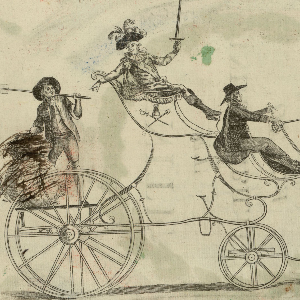Early Modern (1450 CE - 1800 CE)
Beware the Wealthy Bourgeoisie
The term "bourgeoisie" had many meanings in eighteenth–century France, from the most literal sense of "citizens of a city" to a more sociological meaning of talented and cultivated members of the Third Estate. Some eighteenth–century writers also used the term to refer to merchants.

Departure of the Three Orders for Versailles
Although 14 July 1790 was a high point in the aspiration for unity during the French Revolution, the preparation for the Estates–General set the stage for later problems.
Cahiers from Rural Districts: Attack on Seigneurial Dues
The petitions from rural communities decried the abuse of seigneurial dues that peasants owed to lords in exchange for which they were supposed to receive protection and supervision.
Three Cahiers from Orléans
The cahiers de doléances ("list of grievances") drawn up by each assembly in choosing deputies to the Estates–General are the best available source of the thoughts of the French population on the eve of the French Revolution.
Cahiers—A Parish Cahier
The cahiers de doléances ["lists of grievances"] drawn up by each assembly in choosing deputies to the Estates–General are the best available source of the thoughts of the French population on the eve of the Revolution.

The Crushed Aristocracy
This image uses the classical figures of an angel and a cherub to celebrate the achievements of Louis XVI on the base of a statue. The words state that he has destroyed the "aristocracy" and established the liberty of the French people.

Project Wittenberg
It contains the largest online collection of Luther’s writings in English, including more than 100 hymns, as well as writings about Luther by many of his contemporaries and later Lutheran scholars.
The Welcoming of a Marquis in Hell
Reflecting French Revolutionary sentiments, the image points out the destruction of the nobility, depicting the arrival in Hell of a "marquis" and several other "aristocrats," described in the legend as "conspirators" and "traitors."
Abolition of Nobility
The major principle underlying the 4 August decree found legislative expression in the decree of 19 June 1790.

We Must Hope That It Will Soon Be Over
A common complaint of pre-revolutionary rural petitions was the abuse of seigneurial dues owed by French peasants to lords supposedly in exchange for protection and supervision.